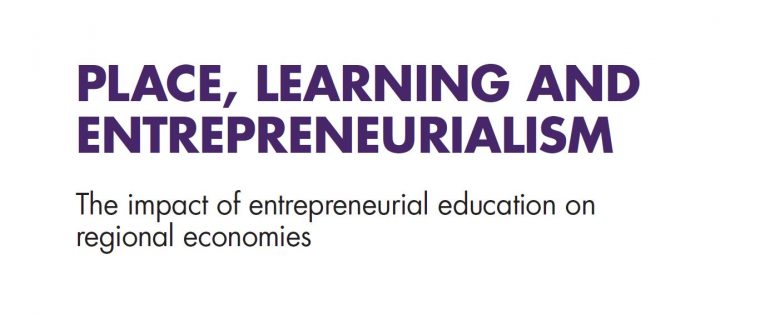Place, learning and entrepreneurialism
The impact of entrepreneurial education on regional economies
Author: David Godfrey and Verity Hubbard |

Place, learning and entrepreneurialism
The impact of entrepreneurial education on regional economies
Universities contribute to one in every hundred new business births in the UK . Across the country, there are pockets of excellence in supporting enterprise and entrepreneurship and there is an escalator of business support. But too many universities are doing too little. According to national research , 35% of universities did not contribute to the production of a single graduate start-up last year. Where there is good practice, too little is known of its true impact.
In partnership with University College London (UCL) and the University of Huddersfield (UoH), we have explored what more can be done to encourage university entrepreneurial activity – and its role in emerging local industrial strategy.
In a series of recommendations we argue that universities should make entrepreneurialism a strategic priority, drawing on best practice to provide every student the opportunity to develop enterprise skills, identifying and nurturing entrepreneurship across all disciplines and enabling access to support as businesses grow. With the risks, challenges and opportunities Brexit presents, we call for new financial support and incentives to replace European Union and UK local growth funding and for independent investment in start-ups outside of London to increase by incentivising greater regional and scale-up funding and increased alumni investment. And through the new Knowledge Exchange Framework process, we call for local economic impact to be assessed and rewarded in the allocation of Higher Education Innovation Fund (HEIF) and related Government growth funding.
With the concept of “place” now at the heart of the Government’s Industrial Strategy, our hope is that their words and this report will elevate the case and profile of entrepreneurial education and encourage both universities and Government to recognise its huge potential in creating the businesses and economic growth of tomorrow.
Report recommendations
Make enterprise and entrepreneurship a strategic priority
Recommendation one: Every student should have the opportunity to develop enterprise and entrepreneurship skills and learning, both within the university curriculum and outside it. Universities must find ways to identify and nurture entrepreneurs across all disciplines and at all stages.
Recommendation two: Enterprise and entrepreneurship must have a mandate. Through strong corporate leadership within universities, the university offer to student and graduate entrepreneurs must be strategic and co-ordinated.
Recommendation three: Universities should review their ‘cut off points’ for enterprise and entrepreneurship support in order to play a more active role in scaling up of businesses not just the pre start-up and start-up phase.
Recommendation four: Incubation units and workspace should be opened up to local entrepreneurs. This will support local SMEs, potentially increase revenue for enterprise units, encourage throughput and provide student entrepreneurs with an immediate and potentially valuable peer network .
Influence the local economy
Recommendation five: Universities’ position as anchors in their local economies should be explicitly recognised in the Government’s Common Framework for devolution and a clear link made to university enterprise and entrepreneurship in the Government’s Review of LEPs. It should be promoted in local economic strategies.
Recommendation six: Universities should provide a “swing door into the local economy” with clear account management of services across the university and alignment with external enterprise and entrepreneurship support through their local Growth Hubs.
Recommendation seven: Government should create conditions that diversify the current capital model to increase independent investment outside of London, retaining existing tax reliefs but incentivising regional and scale-up investment and promoting alumni funding. Vice Chancellors should work with their LEPs, City and County Councils and Mayors to package regional opportunities to pitch to investors.
Recommendation eight: New financial support and incentives should be developed to replace funding for enterprise and entrepreneurship currently available through Local Growth Fund and European funding streams.
Measure and reward impact
Recommendation nine: Local economic impact should be assessed and rewarded through the new Knowledge Exchange Framework and in the allocation of HEIF or related Government growth funding. Universities should first be required to provide commentary illustrating programme impact, with specific impact metrics agreed and introduced to an agreed timetable. National data should be robust and consistent
Recommendation ten: Universities should be incentivised to produce “impact start-ups” and entrepreneurs, demonstrating they are growing local and national economies, with funding increasingly reflecting their success in delivering local economic growth. New longitudinal measures should be developed to measure longer-term impact and encourage the retention of links with student and graduate start-ups to support their ongoing development.
Kindly supported by


